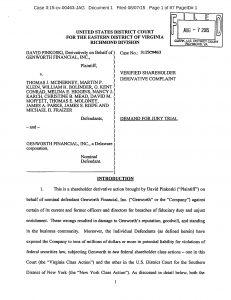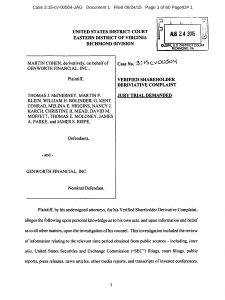In the face of recent losses and a dwindling stock price, two shareholders of Genworth Financial are taking the West End firm’s top brass to task.
A pair of lengthy lawsuits was filed this month in Richmond federal court against a dozen Genworth executives and directors, alleging that the insiders mismanaged the company and “devastated its credibility” by misleading investors and putting out false financial information over the last three years.
The first suit, filed on Aug. 7 by Genworth shareholder David Pinkoski, alleges several counts of breaches of fiduciary duty and unjust enrichment related to the company’s handling of its Australian mortgage unit and its long-term care insurance.
The 87-page case names as defendants CEO Thomas McInerney, CFO Martin Klein, directors William Bolinder, G. Kent Conrad, Melina Higgins, Nancy Karch, Christine Mead, David Moffett, Thomas Moloney, James Parke, James Riepe and former CEO Michael Fraizer.
It claims that they caused and allowed the company to make false statements and report false financial results between Nov. 3, 2011 and Nov. 5, 2014, particularly related to the health of its Australian market leading up to an IPO of its operations there and deficiencies in the calculations of reserves for claims in its long-term care business.
“These wrongs resulted in damage to Genworth’s reputation, goodwill, and standing in the business community,” the Pinkoski case claims.
The second suit, filed last week by shareholder Martin Cohen, makes similar claims against the same defendants, but excludes Fraizer, who resigned in May 2012. The Cohen suit zeroes in specifically on the struggles of Genworth’s long-term care insurance and how the executives and directors have handled the recent costly issues with that line of business.
The Cohen suit claims that the LTC insurance, which provides coverage for in-home care and stays at nursing homes and assisted living facilities, has accounted for approximately 30 percent of the company’s revenue since 2011. That line of business alone generated more than $3 billion a year for the company between 2011 and 2014.
The LTC division’s performance began to significantly impact Genworth’s finances in 2014, when the need to set aside hundreds of millions of dollars of reserves ate away at the company’s profit and fueled huge losses.
Genworth reported a loss of $1.04 billion for the full year 2014, largely fueled by setting aside reserves. Those losses have continued into 2015; Genworth reported a net loss of $193 million in the quarter ending June 30.
Both suits go into painstaking detail over statements the executives made regarding alleged internal reviews of the LTC business and whether it had adequate reserves to cover claims. The cases hold the defendants over the fire, pointing to specific conference calls and investor presentations in 2013 during which defendants allegedly made assurances only to later contradict themselves and admit to problems in the business.
The cases both try to tie the motives of the executives to their compensation plans. McInerney received $11.98 million in total compensation in 2013, the year before large LTC reserves drove the company to big losses. His pay package fell to $2.69 million in 2014.
The cases also reference separate class-action lawsuits filed last year in federal court in Richmond and New York and their potential to expose the company to hundreds of millions of dollars of damages.
The class-action case in Richmond was filed by the City of Pontiac General Employees’ Retirement System and claims violations of federal securities laws related to Genworth’s disclosures about its LTC reserves.
The class-action case in New York was filed by City of Hialeah Employees’ Retirement System and claims violations of securities laws over disclosures related to the Australian mortgage insurance operations.
Genworth fought to have both suits dismissed but was denied earlier this year.
The Pinkoski and Cohen suits claim that the defendants’ mismanagement led to the filing of the class-action cases, which both have “exposed the company to potentially massive liability,” the Cohen suit states.
Genworth has said in filings that it intends to “vigorously defend” itself in the lawsuits.
Both suits also reference the damage done to Genworth’s stock, which trades under the symbol GNW. It closed Friday at $5.17 per share, up 12 cents for the day. The share price is down from more than $14 a year ago. The stock peaked at around $36 per share in 2007, just prior to the recession, and has never fully recovered.
“Indeed, for the foreseeable future, Genworth will suffer from what is known as the ‘liar’s discount,’” the Cohen case argues, “a term applied to the stocks of companies which have been implicated in improper behavior and have misled the investing public, thereby hampering the company’s ability to secure future business partners and financing on favorable terms.”
Both the Cohen and Pinkoski cases are filed on behalf of Genworth in an effort to win damages for the company to be paid by the defendants for their alleged mismanagement. They want restitution from the executives and directors, including forcing them to disgorge the compensation they received during the period in question.
The Cohen suit goes as far as to ask the court to impound certain assets of the defendants to ensure the company has a chance to receive restitution.
Attorney Jeff Geiger of Sands Anderson is representing the plaintiff in the Pinkoski case, along with Atlanta attorney Corey Holzer and several attorneys from the Weiser Law Firm in Pennsylvania.
Cohen is represented in his suit by Harrisonburg, Virginia, attorney Robert Wilson, as well as Schubert Jonckheer & Kolbe in California.
None of the attorneys involved in either case returned calls seeking comment.
Genworth spokesman Tom Topinka said in an email last week that the company does not discuss pending litigation.
Genworth, which employs more than 1,000 people in Richmond, sells life, long-term care and mortgage insurance. It was founded as a subsidiary of General Electric and went public in May 2004.
In the face of recent losses and a dwindling stock price, two shareholders of Genworth Financial are taking the West End firm’s top brass to task.
A pair of lengthy lawsuits was filed this month in Richmond federal court against a dozen Genworth executives and directors, alleging that the insiders mismanaged the company and “devastated its credibility” by misleading investors and putting out false financial information over the last three years.
The first suit, filed on Aug. 7 by Genworth shareholder David Pinkoski, alleges several counts of breaches of fiduciary duty and unjust enrichment related to the company’s handling of its Australian mortgage unit and its long-term care insurance.
The 87-page case names as defendants CEO Thomas McInerney, CFO Martin Klein, directors William Bolinder, G. Kent Conrad, Melina Higgins, Nancy Karch, Christine Mead, David Moffett, Thomas Moloney, James Parke, James Riepe and former CEO Michael Fraizer.
It claims that they caused and allowed the company to make false statements and report false financial results between Nov. 3, 2011 and Nov. 5, 2014, particularly related to the health of its Australian market leading up to an IPO of its operations there and deficiencies in the calculations of reserves for claims in its long-term care business.
“These wrongs resulted in damage to Genworth’s reputation, goodwill, and standing in the business community,” the Pinkoski case claims.
The second suit, filed last week by shareholder Martin Cohen, makes similar claims against the same defendants, but excludes Fraizer, who resigned in May 2012. The Cohen suit zeroes in specifically on the struggles of Genworth’s long-term care insurance and how the executives and directors have handled the recent costly issues with that line of business.
The Cohen suit claims that the LTC insurance, which provides coverage for in-home care and stays at nursing homes and assisted living facilities, has accounted for approximately 30 percent of the company’s revenue since 2011. That line of business alone generated more than $3 billion a year for the company between 2011 and 2014.
The LTC division’s performance began to significantly impact Genworth’s finances in 2014, when the need to set aside hundreds of millions of dollars of reserves ate away at the company’s profit and fueled huge losses.
Genworth reported a loss of $1.04 billion for the full year 2014, largely fueled by setting aside reserves. Those losses have continued into 2015; Genworth reported a net loss of $193 million in the quarter ending June 30.
Both suits go into painstaking detail over statements the executives made regarding alleged internal reviews of the LTC business and whether it had adequate reserves to cover claims. The cases hold the defendants over the fire, pointing to specific conference calls and investor presentations in 2013 during which defendants allegedly made assurances only to later contradict themselves and admit to problems in the business.
The cases both try to tie the motives of the executives to their compensation plans. McInerney received $11.98 million in total compensation in 2013, the year before large LTC reserves drove the company to big losses. His pay package fell to $2.69 million in 2014.
The cases also reference separate class-action lawsuits filed last year in federal court in Richmond and New York and their potential to expose the company to hundreds of millions of dollars of damages.
The class-action case in Richmond was filed by the City of Pontiac General Employees’ Retirement System and claims violations of federal securities laws related to Genworth’s disclosures about its LTC reserves.
The class-action case in New York was filed by City of Hialeah Employees’ Retirement System and claims violations of securities laws over disclosures related to the Australian mortgage insurance operations.
Genworth fought to have both suits dismissed but was denied earlier this year.
The Pinkoski and Cohen suits claim that the defendants’ mismanagement led to the filing of the class-action cases, which both have “exposed the company to potentially massive liability,” the Cohen suit states.
Genworth has said in filings that it intends to “vigorously defend” itself in the lawsuits.
Both suits also reference the damage done to Genworth’s stock, which trades under the symbol GNW. It closed Friday at $5.17 per share, up 12 cents for the day. The share price is down from more than $14 a year ago. The stock peaked at around $36 per share in 2007, just prior to the recession, and has never fully recovered.
“Indeed, for the foreseeable future, Genworth will suffer from what is known as the ‘liar’s discount,’” the Cohen case argues, “a term applied to the stocks of companies which have been implicated in improper behavior and have misled the investing public, thereby hampering the company’s ability to secure future business partners and financing on favorable terms.”
Both the Cohen and Pinkoski cases are filed on behalf of Genworth in an effort to win damages for the company to be paid by the defendants for their alleged mismanagement. They want restitution from the executives and directors, including forcing them to disgorge the compensation they received during the period in question.
The Cohen suit goes as far as to ask the court to impound certain assets of the defendants to ensure the company has a chance to receive restitution.
Attorney Jeff Geiger of Sands Anderson is representing the plaintiff in the Pinkoski case, along with Atlanta attorney Corey Holzer and several attorneys from the Weiser Law Firm in Pennsylvania.
Cohen is represented in his suit by Harrisonburg, Virginia, attorney Robert Wilson, as well as Schubert Jonckheer & Kolbe in California.
None of the attorneys involved in either case returned calls seeking comment.
Genworth spokesman Tom Topinka said in an email last week that the company does not discuss pending litigation.
Genworth, which employs more than 1,000 people in Richmond, sells life, long-term care and mortgage insurance. It was founded as a subsidiary of General Electric and went public in May 2004.



Would love to be able to join any class action suit against Genworth with regard to LTCI… Have had a policy for 14 years and was just hit with a 60% premium increase. As a senior when I may have to use this policy in the near future I find this increase to be criminal, even tho the NYS Insurance Dept. approved it.
I, also, have carried Genworth LTC for many years. I took out the policy when it was GE and was told by the salesperson my premium would never increase. As soon as it became Genworth they starting hinting an increase might come. Now, at 78 I can not afford the increase so what can I do?
Just received a 60 per cent increase on my husband’s and my long term care ins premiums paid in for 15 years . Why is Genworth and those other companies allowed by law to to do this. I would gladly take back my $43,000 but they will not do that. Who do we turn to for help?
My wife and I have had a GE / Genworth LTC policy since 2004; paid in over 40K to date. Recently got hit with a $1600./year premium increase; about 40%. Nice to know that State Insurance regulators are more concerned with the Insurance Company’s bottom line than they are with their senior citizens. We bought this insurance proactively, while we were relatively young when premiums were accordingly lower, as an investment in our future to hedge against prospective health issues that could arise WHEN WE WERE OLDER … unaware that Genworth’s self serving cost hikes would make it prohibitive to… Read more »